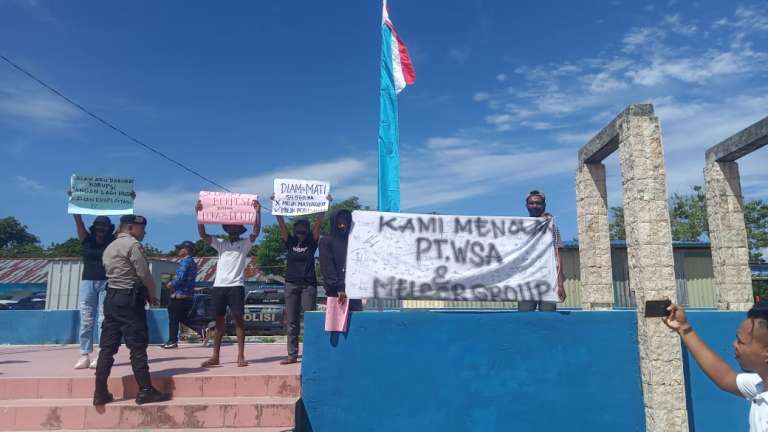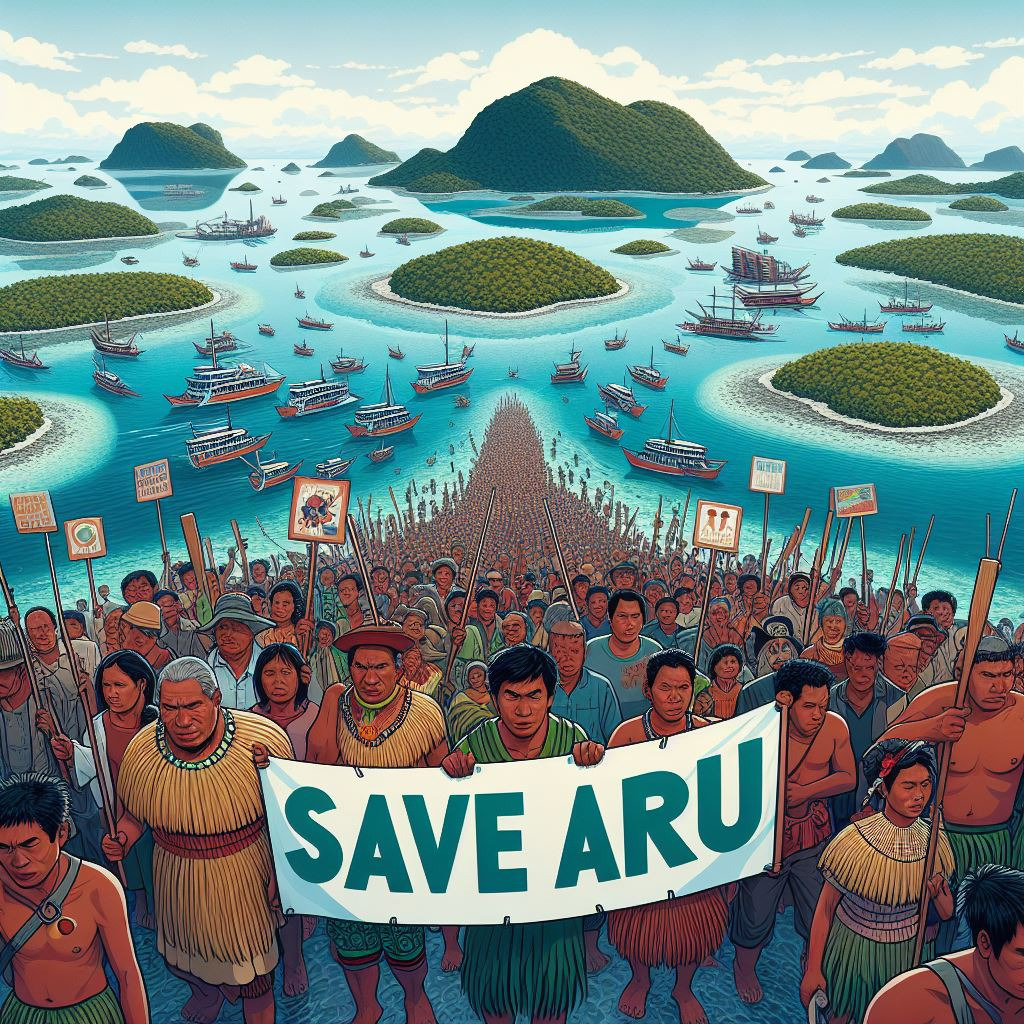Jakarta, December 15th, 2023
To:
Minister of Forestry and Environment (KLHK) of the Republic of Indonesia Governor of Maluku Province
The #SaveAru Coalition, comprised of civil society organization activists, women, youth and students, indigenous peoples, and local communities in the Aru Islands, rejects the investment plans for Business Permit for Utilization of Forest (PBPH) by PT Wana Sejahtera Abadi (WSA), as well as PT Alam Subur Indonesia and PT Bumi Lestari International, subsidiaries of the Melchor Group Indonesia.
The Aru Islands (Jargaria) are a cluster of small islands in the midst of the Arafura Sea. There are over 800 small islands separated by narrow straits often mistaken for rivers. The natural forest area of Aru covers approximately 705,000 hectares or about 85% of its land area. The islands’ landmass is formed by karst rocks with low topography. This results in the absence of extensive river basins (DAS) in the Aru Islands. Therefore, the availability and access to fresh water on some islands are very limited, necessitating some communities to rely on rainwater to fulfill their need of clean water.
Bumi Jargaria, stretching from the eastern tip of Batu Goyang to the northern reaches of Waria Lau, has been fully divided and governed by the indigenous people of Aru through customary land rights (traditional ownership rights). The customary territory serves as the identity for the indigenous people of Aru, as it is where customs, traditions, and culture are born. Protecting the land and forests of Aru is believed to be a message entrusted by their ancestors to be passed down to future generations.
Land, karst, forest, mangrove, river, and sea, along with all that is within them, have a strong connection with the livelihoods of the indigenous people of Aru. During high sea waves (western season), hunting and foraging in the forest become sources of livelihood. However, during calm seas (eastern season), they go fishing in the straits or sea, gather shellfish, and catch crabs in the mangrove forest.
Not only from the sea and forests, farming by cultivating various staple foods other than sago (Metroxylon sagu), such as rice (Oryza sativa), corn (Zea mays ceratina Kulesh), sweet potatoes (Ipomoea batatas), yams (Dioscorea esculenta), cassava (Manihot esculenta), and local vegetables, enables some of the people of Aru to fulfill their own basic needs independently and autonomously.
In 2022, the Aru Islands Regency Government issued a Regional Regulation (Perda) concerning the Recognition and Protection of the Aru UrsiaUrlima Indigenous Community and the legal basis for the Aru indigenous community to pursue legal efforts to obtain recognition of their customary land management. Currently, the community is in the process of conducting participatory mapping of their customary territories, a task already undertaken by the communities in Lorang and Kobamar. This participatory mapping by the indigenous community hopefully will provide an overview of their managed territories and help prevent potential conflicts over land ownership in the future. Other than that, the results of this participatory mapping are expected to serve as a reference for the development of spatial planning and the management of areas based on the Aru indigenous community’s customary practices.

The rejection from the Aru community against large-scale land-based investments that have the potential to harm the environment and destroy water sources and livelihoods has occurred repeatedly. In 2013, the Aru community rejected the Menara Group’s sugarcane plantation investment plan, which covered nearly 70% of the Aru land area. In 2018, the Aru community once again rejected the permit for the largest cattle farm in Indonesia covering around 61,000 hectares in the southern part of Aru. Currently, the Aru community and the #SaveARU coalition are again calling for rejection of the PT WSA and Melchor Group Indonesia investments.
PT Wana Sejahtera Abadi (WSA) has obtained a permit for forest utilization (PBPH-HA) over an area covering as much as 54.560 hectares on Wokam and Woham Islands. There are four districts affected by the activities of this company, which are North East Aru District of Batuley (villages of Kobamar and Kompane), Sir-Sir District (villages of Bardefan and Goda-Goda), Aru Islands District (villages of Gorar, LauLau, Tungu, Tunguwatu, and Nafar), and Central Aru District (villages of Selibata-Bata and Wakua).
The presence of PT WSA in the Aru Islands has sparked concerns and potential conflicts. The forest utilization activities planned by PT WSA are considered high-risk and require significantly high environmental costs. This is because the concession area of PT WSA covers two small islands, namely Wokam Island (140,000 hectares) and Woham Island (30,400 hectares). Moreover, PT WSA also has not followed the required steps outlined in the Ministry of Environment and Forestry Regulation No. 8 of 2021 regarding Forest Management Planning and Forest Utilization in Protected and Production Forests. PT WSA has failed to engage in honest and transparent communication with the local communities, has not developed a work plan, and has not conducted forest inventories.
Melchor Group Indonesia, or Melchor Tiara Pratama (MTP) is the parent company of four major subsidiaries, namely Perisai Alam Sejahtera, Muller Karbon Kapital, Rantai Oxygen Indonesia (ROXI), and Melchor Artha Lestari. In Aru, through its subsidiary Muller Karbon Kapital, namely PT Bumi Lestari International and PT Alam Subur Indonesia, this group of companies is attempting to develop a carbon trading project called the Cendrawasih Aru Project covering an area of 591,957 hectares In June 2022, the Maluku Provincial Government issued a letter of recommendation for PBPH permits for both companies covering an area of 191,955 hectares. The presence of MTP in the Aru community’s managed area has the potential to marginalize the community’s rights to natural resource space, which has long been the livelihood of the community.
In response to and in consideration of the above situation, with full awareness of our commitment to upholding human rights, protecting the environment, and combating climate change, we, the #SaveAru Coalition, state our position and respectfully request to the honorable:
- Minister of Environment and Forestry, to take actions:
- Cease all operations and revoke PT Wana Sejahtera Abadi (forest utilization permits) in the Aru Islands Regency;
- Halt the licensing process for PBPH subsidiaries of the Melchor Group, specifically PT Bumi Lestari Internasional and PT Alam Subur Indonesia in the Aru Islands Regency;
- Conduct a thorough review of the policy for determining forest areas in Maluku Province, with a focus on the Aru Islands Regency;
- Perform an audit of natural resource-based permits and concessions in Maluku Province, particularly in the Aru Islands Regency, and impose strict sanctions, including permit revocation, for any proven violations of the law
- Governor of Maluku Province to take action:
- In line with the governor’s power to halt the operations of PT Wana Sejahtera Abadi in the Aru Islands Regency;
- In accordance with its authority to promptly cease the PBPH licensing procedure for MTP’s subsidiaries, specifically PT Bumi Lestari Internasional and PT Alam Subur Indonesia in Aru Islands Regency;
- Evaluate and amend the Spatial and Regional Planning policies of Maluku Province, with a particular focus on the Aru Islands Regency;
- In accordance with its jurisdiction, refrain from granting permits and endorsements for any natural resource-based industries/concessions that have the potential to harm forests and displace the Aru indigenous peoples from their living spaces.
Thus, we convey this joint statement letter to be distributed and used as appropriate.
Supporters that signed the joint statement letter
- Mufti Barri, Forest Watch Indonesia
- Mika Ganobal, SaveAru, Aru Islands
- Simon Kamsy, SaveAru, Aru Islands
- Gusti Tulewun, Association of Indigenous Peoples Defenders, Aru Islands
- Johan Jamamona, Youth of Aru, Aru Islands
- Maksum Syam, Sajogyo Institute
- Imam Mas’ud, Participatory Mapping Network
- Eko Cahyono, Papua Study Center
- Betty Tiominar
- Natasha Devanand Dhanwani, FIAN Indonesia
- Indraini Hapsari, FIAN Indonesia
- Deden Pramudiana, Independent Forest Monitoring Fund (IFM Fund)
- Franky Samperante, Bentala Rakyat Foundation
- Muhammad Ichwan, Eknas Independent Forest Monitoring Network (JPIK)
- Melky Nahar, Mining Advocacy Network (JATAM)
- Sulfianto Ilyas, Panah Papua Association
- Uli Arta Siagian, National Forest and Plantation Campaign Manager WALHI
- Marianne Klute, Rettet den Regenwald (Save the Rainforest)
- Muhammad Djauhari, Consortium for Community-Based Forest System Support (KPSHK)
- Kasmita Widodo, Customary Territory Registration Agency (BRWA)
- Annas RS, Indigenous Peoples Alliance of Nusantara (AMAN)
- Yuyun Indradi, Trend Asia
- Made Ali, Jikalahari Riau
- Andi Muttaqien, Satya Bumi
- Arta, Manka Association
- Agung Prabowo, HuMa
- Arie Rompas, Greenpeace Indonesia
- Wahyubinatara Fernandez, RMI Bogor
- Dr. Ir. Agustinus Kastanya, MS, Pattimura University
- Buyung Marajo, POKJA 30 KALTIM
- Muhammad Arman, Indigenous Peoples Alliance of Nusantara (AMAN)
- Indonesian Paddy Association
- Equatorial Cosmology Ethnic Association
- Muhammad Isnur, Chair of YLBHI (Indonesian Legal Aid Foundation)
- Muhammad Arman, Indigenous Peoples Alliance of Nusantara (AMAN)
- Imam Shofwan, Mining Advocacy Network
- Herbet Panggabean, Mitra Insani Foundation (YMI)
- Rosima Wati Dewi, Forest Watch Indonesia
- Abu Meridian, Kaoem Telapak
- Timer Manurung, Auriga Nusantara
- Danial Dian Prawardani, Independent Forest Monitoring Network (JPIK)
- Liana, Garda Animalia
- Willem Pattinasarany, IWGFF
- Evelyn Achonheit, Foep Germany
- Indigenous Peoples Association of Pulau Wokam and Woham
- Indigenous Peoples of Fanan Clan
- Residents of Tungu Watu Village
- Residents of Tungu Village
- Residents of Lau-Lau Village
- Residents of Kobraur Village
- Residents of Nafar Village
- Residents of Wakua Village
- Residents of Kobamar Village
- Residents of Goda Goda Village
- Residents of Gorar Village
- Ayut Enggeliah, Sawit Watch
- The Institute for Ecosoc Rights
- Link-Ar Borneo
- Agrarian Reform Movement Alliance (AGRA)
- Legal Studies and Assistance Institute of West Nusa Tenggara
JOINT STATEMENT LETTER DOCUMENT #ARUISLAND




